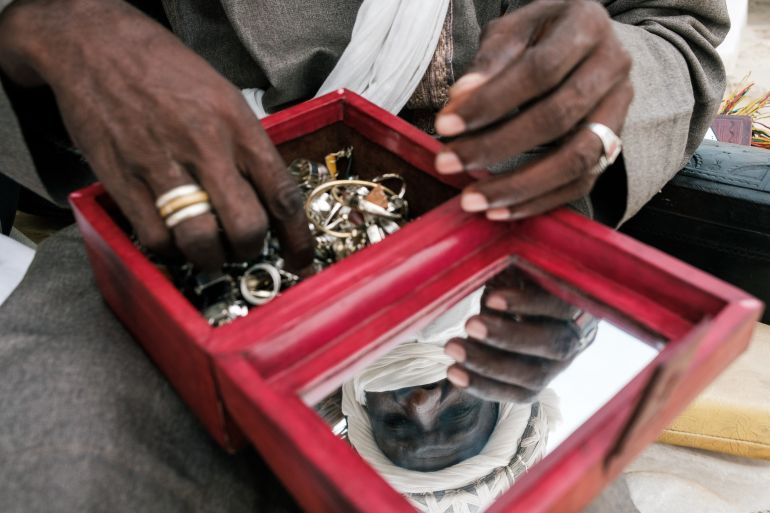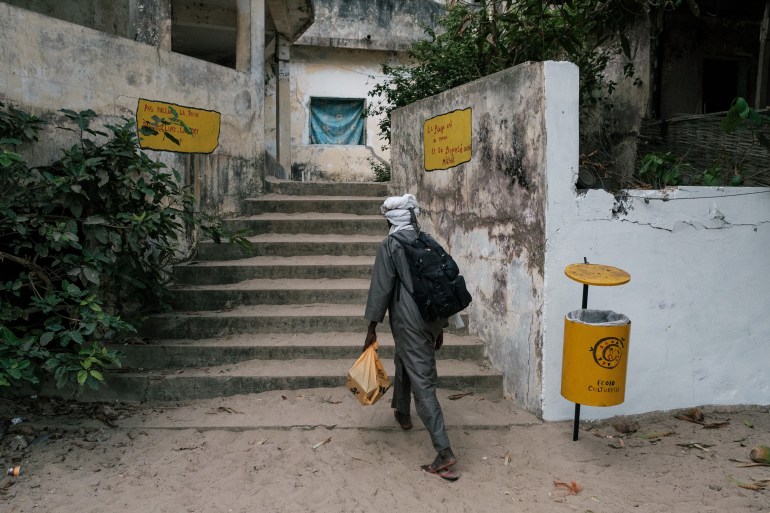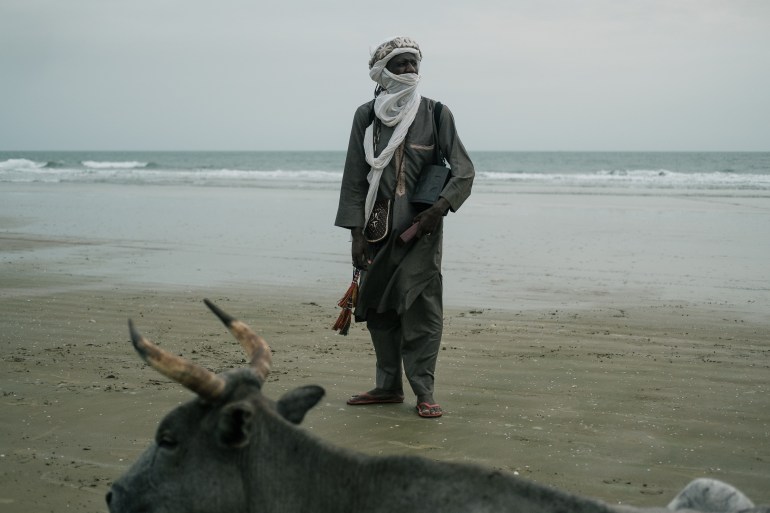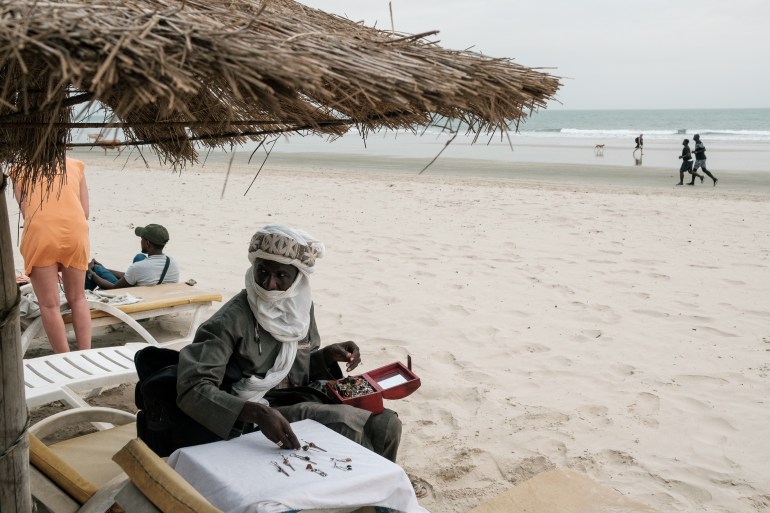‘There’s nothing in Mali’: The Timbuktu salesman roaming Senegal
Dicko, a salesman constantly on the move, is seeking greener pastures not in Europe but much closer to his native Mali.

This article is part of a feature series, Migration within Africa: Home so close to home.
Casamance, Senegal – On a recent Monday afternoon, waves rolled onto the beach and palms swayed in the breeze, another beautiful day in the Senegalese beach town of Cap Skirring – just not for Almounzer Dicko.
Keep reading
list of 4 itemsPolitics and convenience drive Mexico to be US’s top trading partner
Will Xi and Biden mend US-China relations at the APEC summit?
UK warns of Russia laying ‘sea mines’ to deter Black Sea cargo ships
The Malian salesman, with a blanket full of goods splayed out on the sand, has not sold anything all day. The tourists – mostly Europeans escaping from the colder months – have largely returned home for the season.
“Today had nothing,” he said. “There’s nobody.”
This beach town is more than 2,000km (1,242 miles) away from Dicko’s hometown, in the Timbuktu region of neighbouring Mali. But Dicko is no stranger here, either. He has been in Senegal since October, selling the types of leather and silver artisanal goods – from letter openers to rings to necklaces – that Mali’s ethnic Tuaregs have developed an international reputation for.
His lifestyle is well-known in West Africa. It is that of a salesman constantly on the move, seeking greener pastures not in Europe but much closer, whether just the next town over or perhaps just across the border. Then maybe, if all goes well, the next border, too.
Driven by a wish to escape poverty but dependent on the whims of foreign tourists or Senegalese beachgoers, Dicko’s sometimes precarious lifestyle is one of a modern nomad, made difficult by the vagaries of the market and spiced up by the discovery of new lands.
“It’s a bit difficult [but] I like my work because I meet a lot of people,” said Dicko, 56, who has been on the road most of his adult life.
He never went to school as a child but has picked up various local languages – as his travels have taken him from Burkina Faso to Ghana and in between – bits of English and Italian from tourists as well as some African languages, “a little Mooré, a little Hausa, a little Fulani.” His current goal is to make enough money so he can eventually learn to read and write.
As evening fell that Monday, he racked up 35,000 West African CFA francs ($50) in daily sales, enough to cover his expenses for the next few days, as he tallied his inventory and placed wholesale orders back home for items he was running low on.
Each evening, he wraps up his goods in cloth, blankets and plastic bags to haul them home.

From one African country to the next
While most major media coverage on migration is dedicated to African and Middle Eastern migrants trying to make their way to Europe, or the United States’s constant political struggle over its southern border with Mexico, most African migrants are actually like Dicko: They have moved from one African country to the next, with no intention of going to Europe.
Polling from the International Organization for Migration, which dedicates a lot of time and money to discouraging clandestine migration to Europe and facilitating deportations, found that 80 percent of African migrants intend to stay on the continent.
That tracks with trends in real life.
The majority of Africans living outside their country of birth or descent – up to 80 percent as per some estimates – are migrants who have moved from one African country to another, according to United Nations and IOM figures.
Up to 80 percent of migrants in West Africa stay on the continent, according to Nigeria’s Human Resources Development Centre. That figure stands at 65 percent in Southern Africa, 50 percent in Central Africa and 47 percent in Eastern Africa. North Africa is the exception, where about 90 percent of emigrants move outside the continent.
Scholars have been able to debunk the idea that most Africans leave the continent for Europe, said Samuel Okunade, a Nigerien migration researcher and senior postdoctoral fellow at the University of Pretoria in South Africa.
At the same time, intra-African migration “contributes immensely to the transfer of skills, labour and capital” as people move for white-collar jobs, university studies, or artisanal or physical labour, he told Al Jazeera.
“And these are factors that speed up economic development,” he said. “If that is taken away, then the rate of development, or the pace at which the African continent develops, will be impeded.”

‘More and more complicated’
Since 2012, Mali has been in the throes of violence by al-Qaeda-linked armed groups. But Dicko started travelling well before the current war in Mali tore much of his country apart – pushed instead by a desire to escape the poverty of the rural north.
He first went on the move in 1983, leaving Mali after a crushing drought and ending up as a butcher in Burkina Faso. He then bounced around Togo, Ghana and Côte d’Ivoire, where he applied skills he had learned in Mali in woodworking and leatherwork to start selling his handiwork, returning home only a few times every couple of years.
And while plenty of migrants pour into Senegal’s bustling capital, Dakar, salesmen like Dicko are not limited to major Senegalese metropolises. Cap Skirring, despite its tourist draw, is ultimately a small beach town.
Door-to-door cobblers and tailors from as far as Niger have been known to pop up in Senegalese villages, sleeping in the courtyard of local village chiefs’ homes if the town is too small to have a hotel.
In the morning, they are off again, on foot, after asking directions to the next village and slowly disappearing over the horizon.
The jobs are often not glamorous but, sometimes, they can bring unassuming wealth.
Abdoul Malick Mamadi is one of the many entrepreneurial young men walking Dakar’s beaches on any given day, clanging a pair of metal scissors to signal to customers that he is open for business
“We are just seen as nail cutters here in Senegal,” said Mamadi, who, like many of the informal pedicurists on Dakar’s beaches, is a Nigerien immigrant.
But he can make “at least” 5,000 West African CFA francs ($8.3) a day here, Mamadi told Al Jazeera. When his friend and fellow nail clipper Ismaila went back to visit Niger recently, “some of our friends there have asked him to tell me to send them cell phones and shoes from Senegal. Ismaila’s family told him that he should get married now that he has money.”
“Nobody ever asked me for anything when I was working as a barber in Tawa [in Niger],” said Mamadi, who hopes to visit his family soon.
But while there are many Dickos going from town to town in Senegal and elsewhere in West Africa, Mohamed El Maouloud Ag Hamid wishes there were fewer.
“We’re trying to train a lot of young artisans, to fight against the poverty in our region and continue to preserve the know-how, and create a better future for our youth,” said Ag Hamid, the founder of Timidwa, an association of artisans from Timbuktu.
“It’s really important that the youth have something to do,” he said. “It’s important that the youth can stay home, so they don’t have to travel elsewhere … and to have an impact on their community.”
That can be a hard sell these days as insecurity in the region has devastated both international tourism and the domestic economy. Even artisans who do not leave the country sometimes set up artisanal shops in Bamako, hoping to tap into the bigger – if still weakened – markets in the capital.
“It’s become more and more complicated for artisans since 2012,” acknowledged Ag Hamid. But “if there’s no tourism, we must create local tourism” to make up for it, he added.

‘There’s nothing in Mali’
Dicko has not seen his two brothers, their children or his sister since last year, though they talk each day by phone.
The difficulties of far-flung voyages have been made easier by modern-day conveniences like WhatsApp. “I miss them, but I contact them each morning,” he said.
Unlike many migrants, Dicko does not have to stress about sending money back home. He has been married and divorced several times but never had children. Asked if his life on the road makes having a family difficult, he demurs.
But he sends money back to a widow’s association in Mali when he can. “I feel for the poor,” said Dicko, who does not make much himself.
Even in towns like Cap Skirring, 500km (310 miles) away from Dakar, migrants like Dicko can apply to larger immigrant networks for help. After arriving, he struck up a conversation with some Hausa men selling barbecued meat – the meat-and-onion platters, called dibi, are so tied to Nigerien immigrants in Senegal, they are also known as dibi Hausa.
Dicko was able to secure a place to stay with them in a garage.
A few weeks ago, Dicko found himself in Dakar, hoping to make his way to Morocco where the tourist market is much bigger. But he could not get the requisite visa to travel by aeroplane. Afterwards, he headed south to Mbour, in hopes of plying his trade in that rapidly expanding coastal city, but found the beaches lacking customers.
So he went back to Cap Skirring. Things are so-so this time of year, during the off-season, but he knew the town had served him well before.
“There’s nothing in Mali, there’s nothing in Bamako. I can’t return to my village, because in my village there’s no work,” Dicko said. “I would prefer to stay in Mali. … But you have to leave.”
Additional reporting by Mady Camara from Dakar, Senegal.